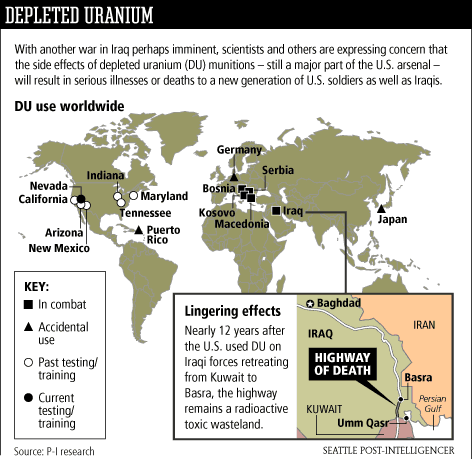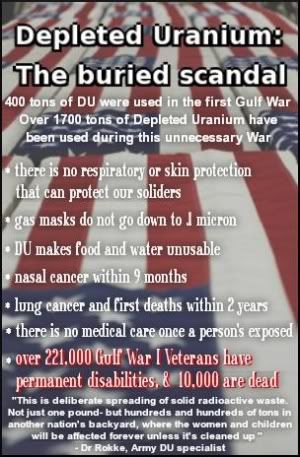Use of Depleted Uranium proved in NATO Bombings
This post was first published in TH!NK ABOUT IT site 21st February 2009.
 An Italian non-governmental organisation – the Rome-based “Un ponte per …” - is investigating consequences of NATO's 1999 bombings of Serbia and the effects of the use of depleted uranium (DU) on the civilian population. The NATO allegedly used shells with depleted uranium which are still today causing an increase in the number of cancer patients. NATO has admitted the use of DU in the bombing campaign and Italian media has reported that 45 Italian soldiers who served in the international forces in Kosovo (KFOR) died after the bombing and 515 became ill with cancer. In Serbia and its separatist province Kosovo the number of civilian victims is still unexplored but most likely the figures are manifold compared to those of soldiers.
An Italian non-governmental organisation – the Rome-based “Un ponte per …” - is investigating consequences of NATO's 1999 bombings of Serbia and the effects of the use of depleted uranium (DU) on the civilian population. The NATO allegedly used shells with depleted uranium which are still today causing an increase in the number of cancer patients. NATO has admitted the use of DU in the bombing campaign and Italian media has reported that 45 Italian soldiers who served in the international forces in Kosovo (KFOR) died after the bombing and 515 became ill with cancer. In Serbia and its separatist province Kosovo the number of civilian victims is still unexplored but most likely the figures are manifold compared to those of soldiers.
This topic was discussed years ago when e.g. I was working in Kosovo, however any proof and warnings then did not came to my hands. Later more information was available and on 24th Nov. 2008 I wrote an article “Depleted Uranium from NATO bombs killing people in Balkans” referring information I got from Croatian news portal Javno.
And DU is…?

To get picture above larger go to link .
The recent military use of DU
Over the 78 days of NATO bombing, a total of 31,000 shells with depleted uranium, weapons banned by international treaties, were dropped in at least 112 locations in Serbia and especially Kosovo region. Earlier in Bosnia-Herzegovina around 10,000 rounds were fired in operations around Sarajevo in the latter stages of allied operations in Bosnia. More than 100,000 DU shells were fired during the Gulf war 1991.
A map of places where DU has been used either in combat or by accident below:

Un Ponte per…
Un Ponte per… (UPP) is a volunteer association established in 1991 just after the end of the bombings on Iraq. Its aim was to promote humanitarian aid to the Iraqi population. When the war in the Balkans escalated, the association created new campaign and started various projects aimed at sending medicines and health supplies to the Yugoslav Federation and helping refugees from Kosovo. UPP’s institutional partners include ECHO, UNHCR, UNICEF, UNESCO,UNOPS,UNHOCI ,UNRWA, Italian Municipalities and Regions and Provinces, and more info about their activities can be found from their web-site .
New investigation in Serbia/Kosovo
Now the 'Un ponte per...' NGO investigator Alessandro di Meo told Adnkronos International (AKI) that the international community was turning a deaf ear to the problem, because the use of depleted uranium is prohibited by international conventions. “But ten years after the bombing, the world has the right to know what really happened and what the consequences are,” he said. Samantha Menngarelli – also investigator of “Un ponte per…” - said the truth about military casualties was slowly sinking in in Italy after a surprising increase in deaths and cancers amongst soldiers who served in KFOR. “But the civilian victims have been completely ignored and we want to shed light on this problem,“ she said. (Source: Andkronos International )
The ‘Un ponte per…’ investigators will tour several Serbian cities that were hardest hit during the bombings before submitting a report to the Rome-based NGO.
Same time a Serbian NGO, ironically called 'Merciful angel' the name of NATO's 1999 airstrikes, recently reported that cancer ailments have jumped about 200 percent in some parts of Kosovo and areas of Serbia that were most heavily bombed. Earlier Javno news portal reported that in Kosovo’s Kosovska Mitrovica in 2005 there were 38 percent more cancer patients than in 2004. In those two years, a total of 3,500 cancer cases in Kosovo Albanians were diagnosed. Elsewhere since 2001, medical personnel at the Basra hospital (Iraq) claimed that they observed a sharp increase in the incidence of child leukemia and genetic malformation among babies born in the decade following the Gulf War. (More e.g. in Croatian news portal “Javno” 17.11.2008)
Contradictory topic
The British and US governments have long denied that DU ammunition is harmful. The British Gulf Veterans and Families Association have for years called for systematic testing. It claims that "hundreds" of Gulf warriors have died of cancers and other illnesses contracted during active service. Also WHO is quite cautious about health risks of DU (More in WHO factsheets ).
There is huge contradiction between official position of DU users and findings on the ground. The situation is a bit similar like position of tobacco industry compared the one of smokers – many have been died but direct evidence of causality is missing.
There is a developing scientific debate and concern expressed regarding the impact of the use of DU projectiles and it is possible that, in future, there will be a consensus view in international legal circles that use of such projectiles violate general principles of the law applicable to use of weapons in armed conflict. No such consensus exists at present. In United Nations in December 2008, 141 states supported a resolution requesting that three UN agencies: United Nations Environment Programme (UNEP), WHO and IAEA update their research on the impact of uranium munitions by late 2010.
 From the other side there is also growing movement to ban DU military use. International Coalition to Ban Uranium Weapons (ICBUW) – is now comprising over 102 member organisations in 27 countries. From their web-site one can check latest developments.
From the other side there is also growing movement to ban DU military use. International Coalition to Ban Uranium Weapons (ICBUW) – is now comprising over 102 member organisations in 27 countries. From their web-site one can check latest developments.
If the causality between DU military use and morbidity will came clear one could speak war crime and demand some responsibility from those who have decided to them. This could also be one connecting factor in Balkans because DU maybe is killing people - civilians and soldiers - there regardless of their ethnicity, religion and country as well foreigners in mission.
More my articles one may find from my Archives:Blog!
Comments
DUStory-owner@yahoogroups.com
"Italian media has reported that 45 Italian soldiers who served in the international forces in Kosovo (KFOR) died after the bombing and 515 became ill with cancer"
Who is the "I" who is making the following claims and where is there support? The claims are bogus - so where do these false accusations come from?
"This topic was discussed years ago when e.g. I was working in Kosovo, however any proof and warnings then did not came to my hands. Later more information was available and on 24th Nov. 2008 I wrote an article “Depleted Uranium from NATO bombs killing people in Balkans” referring information I got from Croatian news portal Javno. And DU is…? [Photo] To get picture above larger go to link . The recent military use of DU Over the 78 days of NATO bombing, a total of 31,000 shells with depleted uranium, weapons banned by international treaties, were dropped in at least 112 locations in Serbia and especially Kosovo region. Earlier in Bosnia-Herzegovina around 10,000 rounds were fired in operations around Sarajevo in the latter stages of allied operations in Bosnia. More than 100,000 DU shells were fired during the Gulf war 1991."
No depleted uranium "shell" was ever fired anywhere. There is no such thing as a "depleted uranium" shell. A shell is a hollow projectile filled with explosive that detonates near or after hitting the target. The DU kinetic energy penetrator is not hollow and does not contain explosive - it is a solid metal rod. The only DU penetrators fired in the Balkans were 30mm penetrator rounds with about 20mm diameter penetrators about 4 inches long encased in an aluminum jacket. The UNEP has found many of these penetrators intact. There are a number of photos of intact penetrators within the jacket, partially within the jacket and completely separate from the aluminum jacket but still intact. These photos are in all three of the reports,
Depleted Uranium in Bosnia and Herzegovina. Post-Conflict Environmental Assessment, March 2003
UNEP Final Report: Depleted Uranium in Serbia and Montenegro - Post-Conflict Environmental Assessment in the Federal Republic of Yugoslavia, 2002
UNEP Final Report: Depleted Uranium in Kosovo - Post-Conflict Environmental Assessment, 2001
All three of these reports, each based on extensive field and laboratory research, can be found at http://postconflict.unep.ch/publications.php?prog=du
When you read them, you find that there was no evidence that "Depleted Uranium from NATO bombs was killing people in the Balkans" - in fact, you find no evidence of any deaths whatsoever. The other part of the above title is that no NATO bomb had any DU in it, but the real evidence is the extensive UNEP reports, hundreds of pages of facts.
Roger
DUStory-owner@yahoogroups.com